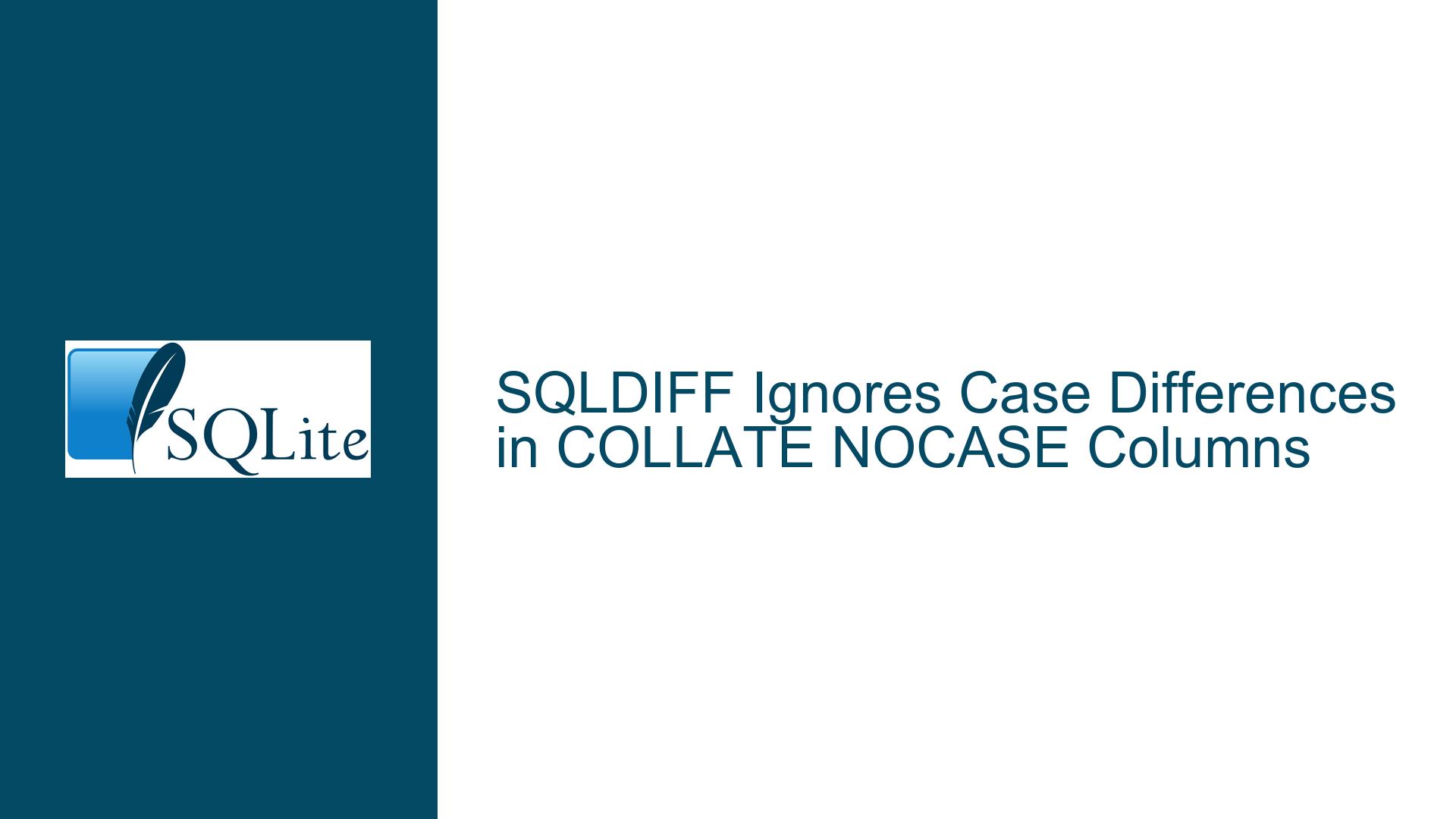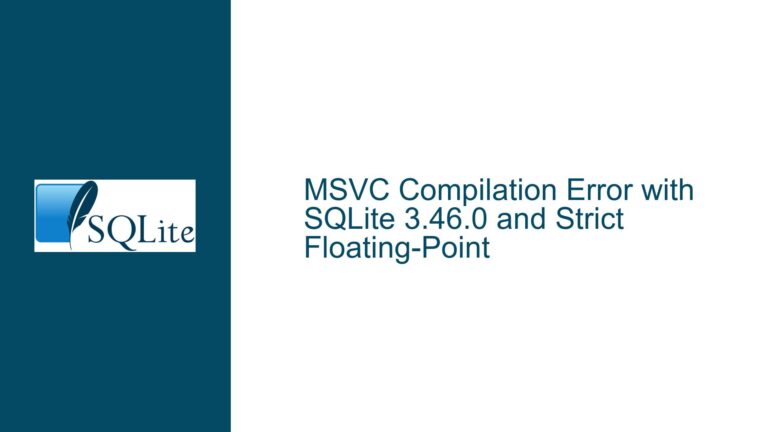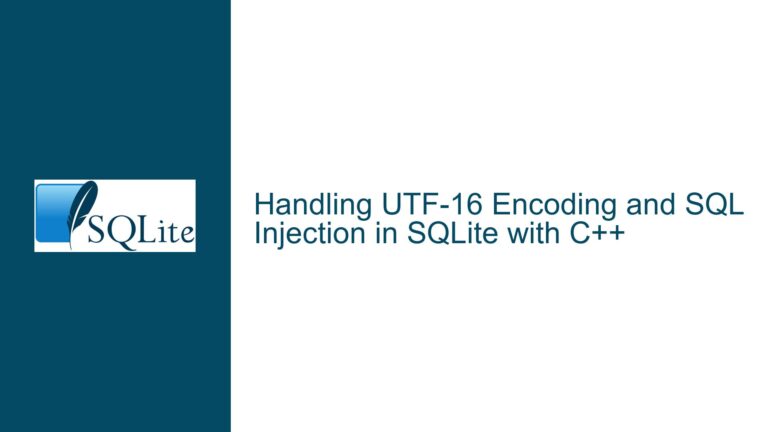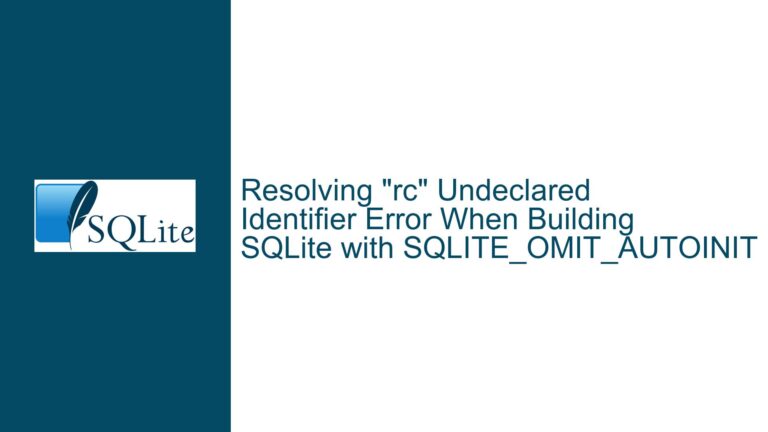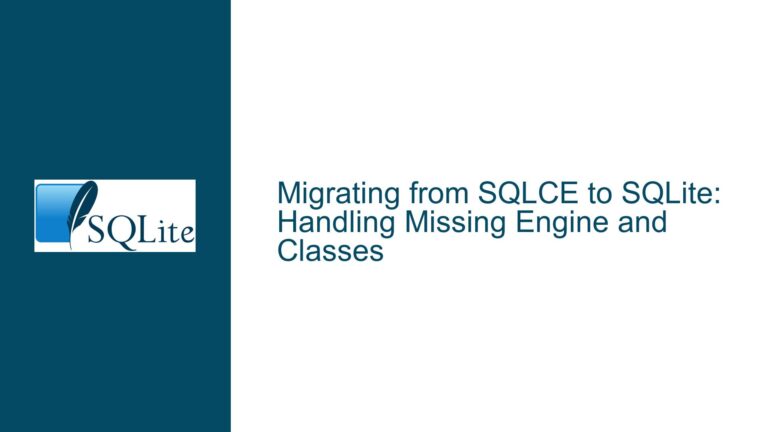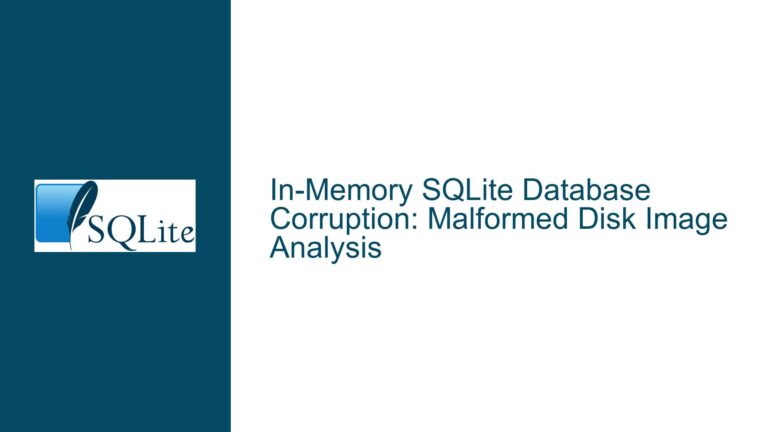SQLDIFF Ignores Case Differences in COLLATE NOCASE Columns
SQLDIFF Fails to Report Case Differences in COLLATE NOCASE Columns
The SQLDIFF utility is designed to identify and report differences between two SQLite databases. However, when a column uses the COLLATE NOCASE attribute, SQLDIFF does not report differences in case sensitivity. For example, if one database contains the value ‘sample’ and another contains ‘SAMPLE’ in a COLLATE NOCASE column, SQLDIFF will treat these values as identical and will not flag them as different. This behavior is intentional, as SQLite considers these values logically equivalent under the COLLATE NOCASE rule. However, this can be problematic for users who expect SQLDIFF to highlight all differences, including case variations, for practical purposes such as database synchronization or patch file generation.
The issue arises because SQLDIFF is designed to reflect the logical equivalence of values in COLLATE NOCASE columns, rather than their literal byte-for-byte differences. While this aligns with SQLite’s internal handling of case-insensitive comparisons, it may not align with user expectations, especially when the goal is to ensure that two databases are byte-for-byte identical or when case differences are meaningful for display or other purposes.
Interplay Between COLLATE NOCASE and SQLDIFF’s Logical Comparison Logic
The root cause of this behavior lies in the interaction between SQLite’s collation rules and SQLDIFF’s comparison logic. When a column is defined with COLLATE NOCASE, SQLite treats values as equal if they differ only in case. For example, ‘sample’ and ‘SAMPLE’ are considered the same value in a COLLATE NOCASE column. SQLDIFF leverages this behavior to determine logical differences between databases. As a result, it intentionally ignores case differences in such columns.
This design choice reflects SQLite’s philosophy of prioritizing logical equivalence over literal byte-for-byte comparisons. However, it introduces a potential mismatch between SQLDIFF’s output and user expectations. Users who rely on SQLDIFF to generate patch files or synchronize databases may find that case differences are not propagated, leading to inconsistencies in data display or other downstream effects.
Additionally, the COLLATE NOCASE attribute is primarily intended to facilitate case-insensitive retrieval, not to alter the storage or display of data. SQLite preserves the original case of values in COLLATE NOCASE columns, which means that case differences are still meaningful for display purposes. This creates a subtle incongruity: while SQLite treats ‘sample’ and ‘SAMPLE’ as logically equivalent, they remain distinct in terms of their stored representation and display behavior.
Implementing Workarounds and Enhancing SQLDIFF for Case-Sensitive Comparisons
To address this issue, users can employ workarounds or advocate for enhancements to SQLDIFF. One immediate workaround is to manually compare COLLATE NOCASE columns using a case-sensitive collation, such as COLLATE BINARY. For example, attaching both databases and running a query like the following can reveal case differences:
ATTACH 'b.db' AS b;
SELECT t.s AS t1, (b.t.s COLLATE BINARY) AS t2
FROM t
INNER JOIN b.t ON t.s = b.t.s
WHERE t1 <> t2;
This query explicitly compares the values using a case-sensitive collation, ensuring that case differences are detected. While this approach requires manual intervention, it provides a way to identify discrepancies that SQLDIFF overlooks.
For a more permanent solution, users can advocate for an enhancement to SQLDIFF that introduces an option to ignore the COLLATE NOCASE attribute during comparisons. This option would allow SQLDIFF to report case differences in COLLATE NOCASE columns, aligning its behavior with user expectations for practical database comparisons. The default behavior could remain unchanged to preserve backward compatibility, while the new option would cater to users who require case-sensitive comparisons.
Another potential enhancement is to modify SQLDIFF’s output to include a warning or note when it encounters COLLATE NOCASE columns. This would alert users to the possibility of case differences being ignored and provide guidance on how to perform a case-sensitive comparison if needed.
In the absence of such enhancements, users should carefully consider the implications of using COLLATE NOCASE columns in their database schema. If case differences are meaningful for their use case, they may need to avoid COLLATE NOCASE or implement additional validation steps to ensure data consistency.
Detailed Analysis of SQLDIFF’s Behavior and User Expectations
To fully understand the issue, it is important to delve into the technical details of SQLDIFF’s behavior and how it interacts with SQLite’s collation rules. SQLDIFF operates by comparing the logical content of two databases, rather than their physical representation on disk. This means that it respects SQLite’s internal rules for value equivalence, including collation rules.
When SQLDIFF encounters a COLLATE NOCASE column, it uses the case-insensitive comparison logic defined by SQLite. As a result, values that differ only in case are treated as identical, and no difference is reported. This behavior is consistent with SQLite’s handling of COLLATE NOCASE columns in queries, where ‘sample’ and ‘SAMPLE’ would be considered equal in a WHERE clause or JOIN condition.
However, this behavior can be counterintuitive for users who expect SQLDIFF to highlight all differences, including case variations. For example, if a user is generating a patch file to synchronize two databases, they may expect the patch to include updates that correct case differences. If SQLDIFF ignores these differences, the resulting patch file will not achieve the desired synchronization.
This discrepancy between SQLDIFF’s behavior and user expectations highlights a broader challenge in database tools: balancing logical equivalence with practical utility. While SQLDIFF’s current behavior is technically correct from a logical perspective, it may not fully meet the needs of users who require precise, byte-for-byte comparisons.
Exploring Alternatives and Best Practices
Given the limitations of SQLDIFF in handling COLLATE NOCASE columns, users may need to explore alternative approaches for comparing databases. One option is to use a custom script or tool that performs a case-sensitive comparison of COLLATE NOCASE columns. This script could leverage SQLite’s COLLATE BINARY attribute to ensure that case differences are detected.
Another approach is to avoid using COLLATE NOCASE columns altogether if case differences are meaningful for the application. Instead, users can implement case-insensitive comparisons in their application logic, while storing data in case-sensitive columns. This approach provides greater control over how case differences are handled and ensures that they are preserved in the database.
For users who must use COLLATE NOCASE columns, it is important to document the implications of this choice and establish clear guidelines for handling case differences. This may include implementing additional validation steps or using supplementary tools to ensure data consistency.
Conclusion
The issue of SQLDIFF ignoring case differences in COLLATE NOCASE columns underscores the importance of understanding the interplay between SQLite’s collation rules and database comparison tools. While SQLDIFF’s behavior is technically correct from a logical perspective, it may not align with user expectations for practical database comparisons. By employing workarounds, advocating for enhancements, and adopting best practices, users can address this issue and ensure that their database comparisons meet their needs.
